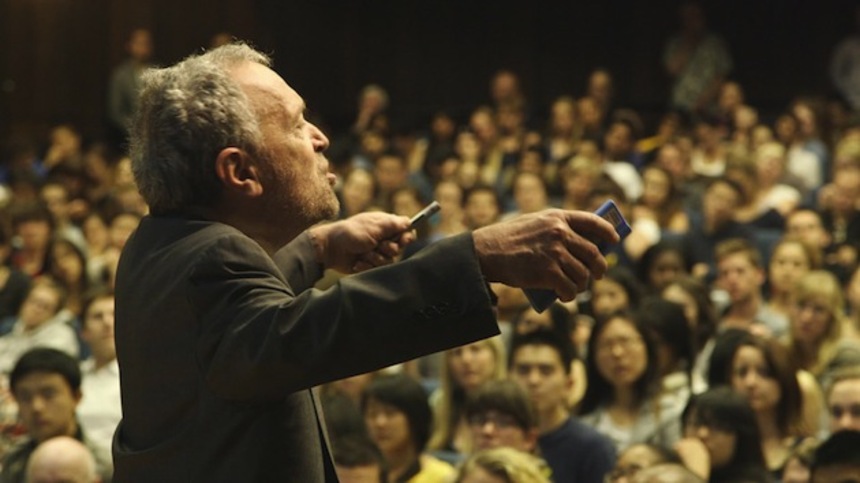Review: In INEQUALITY FOR ALL Robert Reich Takes His Economics Class On The Road

Kornbluth and his team present the economic crisis (and I don't think using that word is hyperbolic) at hand in a number of ways, their subject Reich, filtering and toning the content of the film with his many years' experience as a professor and economist. First and foremost the film acts as a year-in-the-life, beginning and ending with Reich teaching a wealth and poverty class at UC Berkley. To his students he is friendly, funny and passionate; his goals for them with the class is that by knowing where we've come from and knowing all the possible avenues in which we've let ourselves down, we can then better ourselves. Reich thusly states as the proposition of the film: "The question is not inequality per se, the question is when does inequality become a problem? How much inequality can we tolerate and still have an economy that's working for everyone and still have a democracy that's functioning."
Reich is, in two words, an optimistic realist, and though I left the film frustrated and shaken at the plight of so many people due to abuse and/or neglect from companies and governments, the film works in this optimistic fashion too.
Yes, we do get the stories from the front lines that many might roll their eyes at. We have the father who was laid off, the power plant employee who has no benefits, and the CEO of a pillow company (surprise, pillows are a lucrative business) that states people of his ilk are not the job creators, but it is the customers who are. That's a very telling quote from a man who has a much lower tax rate than the average American. A man who is in a class of people who, in 1970, took home 9% of the nation's income, and today, who take in roughly 23%. But people who earn $10 million annually, don't spend that much a year. Even in today's shaking economy the middle class represents 70% of spending in America. Our most valued product then is ourselves.
What personally frustrates me here is that the film and Reich believe that a healthy economy is fueled by people being consumers, conscious consumers, but consumers nonetheless. I don't want to go down this rabbit hole, but I have to believe there is another way than merely being consumers. I don't really know what that is, but neither do I want to use this space to gab on and on about personal agendas, because at the end of the day, if there is a more equal distribution of wealth through transparency and education then that's fine and good.
As Reich travels the country, giving lectures to union workers, classrooms, business honchos etc. his take is that a few things that got us to this level of inequality happened: Firstly, by the late 1970s wages tapered off (a meat packer in the mid 1970s made $41,000 dollars a year, adjusted for inflation, versus $24,000 now). You then had the deregulation of the stock market, labor unions dissolving due to big business bullying and most manufacturing moving overseas. None of this is new knowledge; none of it is very hard to gather from where our economy is at now, but seeing many figures coupled with the hard monthly living expenses of people is startling, and indeed, frustrating. Reich's feeling on all of this is that people need to be educated, they need to have a highly developed skill set and be in a work environment where that can be put to good use, and grow and get rewarded for it. This education can come from college, trade schools, and being a part of a union; things that in many arenas are either no longer as accessible or do not exist with the same presence as they once did. For instance in the 60s UC Berkley was free, by the 70s it was $700 a year for in-state students, and it is now $15,000 for in-state)
The film's consensus is concisely this: Empowerment, growth, betterment and wealth (of all kinds, not just monetary) comes from knowledge and heathy communication. Kornbluth uses the cinematic medium as a platform for keeping the conversation going with a charismatic man of the people at the helm, and plenty of easy to read charts, graphs and animations on a textbook worth of data, plus an eclectic slew of talking heads. It may not be the most inventive documentary but it is effective and worthwhile, if only to remember that we're all in this together, even if some of us have more than others.

Do you feel this content is inappropriate or infringes upon your rights? Click here to report it, or see our DMCA policy.





